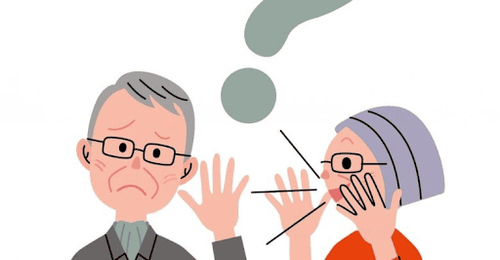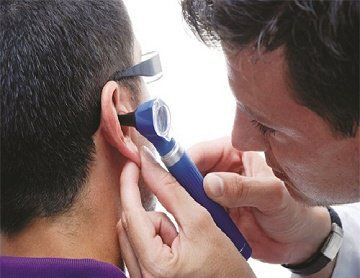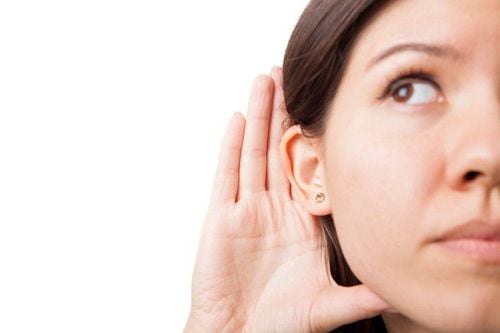This is an automatically translated article.
Hearing loss can occur suddenly, or progress gradually without the person realizing it. Hearing loss is mostly not life-threatening, but patients are gradually isolated because they cannot hear sounds from the world around them, seriously affecting their quality of life.
1. What is hearing loss?
Hearing loss is a condition when any part of the ear does not work properly. Hearing loss is not fatal, but it seriously affects a person's quality of life and relationships.
Classification based on damaged part, hearing loss is divided into:
Conductive hearing loss : Outer ear or inner ear malfunction Sensory hearing loss : Problem area is inner ear Hearing loss Mixed: The patient encounters 2 types at the same time. Several factors such as age, disease and genetics can be the cause of hearing loss. Modern life creates many other triggers including certain drugs, along with many sources of constant loud noises.
With so many cases of hearing loss untreatable, prevention is the best way to preserve hearing. Even if you have lost your hearing, there are ways to help people continue to live a normal life and share with family and friends.
2. Symptoms of Hearing Loss
In many cases, hearing slowly decreases without the patient even knowing it. They just have the feeling that everyone around them is whispering, people in the house have to speak louder or simply need a new phone. As long as the patient can still hear the sound, the patient still thinks that his hearing is still normal. But in fact, they are gradually being separated from the world of sound and noise. But how do you know if you have a hearing problem?
Doctors classify hearing loss by grade:
Mild hearing loss: The patient can still hear one-to-one conversations, but has difficulty hearing all words when surrounded by background noise. Moderate hearing loss: Patients often have to ask people to repeat words both in person and over the phone. Severe hearing loss: It is nearly impossible for the person to communicate normally without a hearing aid Severe hearing loss: The person cannot hear what people say unless they scream loudly. You also can't understand what they say without hearing aids or cochlear implants. The first symptom is having difficulty hearing high-pitched sounds, like children's or women's voices, as well as "" s" or "f". There are also the following signs:
Difficulty keeping up with conversations when more than 1 person is speaking Presumes that others are mumbling or speaking indistinctly Often misunderstands what others say and reacts inappropriately Complaints about the TV being too loud Hearing sounds like ringing bells, roaring or hissing sounds in the ears, also known as tinnitus

Người bị suy giảm thính giác thường bị ù tai
3. Causes of Hearing Loss
Our ear is divided into 3 parts, the path of sound waves is as follows:
Outer ear where the eardrum vibrates. Middle ear, second destination of sound vibrations, then the vibrations are amplified by 3 small bones: malleus, incus, and stirrup. In the inner ear, there's an organ called the cochlea - it's spiral shaped - it has tiny hairs that help change amplified vibrations into electrical signals and send them to the brain, where we hear them as sounds. bar. Aging is the most common cause of hearing loss. One in three people aged 65 to 74 years have some degree of hearing loss. After the age of 75, 1 in 2 people have a hearing problem.
Researchers still don't understand exactly why hearing declines with age, possibly due to long-term exposure to sounds and other harmful agents gradually developing the delicate mechanical machinery of the ears. . Genetics can also be to blame.
Loud or continuous noise impairs hearing. The CDC reports that about 22 million American workers are exposed to hazardous noise levels on the job. This includes many carpenters, construction workers, soldiers, miners, factory workers, and farmers.
Musicians are also at risk for noise-induced hearing loss. Some musicians wear special earplugs to protect their ears when performing. Earplugs help them listen to music without harming the inner workings of the ear.
Some medications can impair hearing or balance. More than 200 drugs and chemicals have been documented to cause hearing and balance problems in addition to their ability to fight disease.
Certain antibiotics Chemotherapy drugs Aspirin Loop diuretics A drug for malaria Many drugs for erectile dysfunction Sudden hearing loss usually occurs in only one ear. Although there are more than 3 cases out of every 10,000 people each year, doctors still can't find a cause in most cases.
Diseases such as heart disease, high blood pressure and diabetes put the ears at risk of being affected by the blood supply to the ears. Otosclerosis is a bony disease of the middle ear, and Meniere's disease affects the inner ear. Both diseases can cause hearing loss.
Trauma, especially skull fracture or perforated eardrum, puts the ear at risk for severe hearing loss.
Infections or earwax can clog the ear canal and impair hearing.
4. Diagnosing Hearing Loss
To diagnose the extent of hearing loss, doctors usually use the following methods:
Physical exam to check for earwax, infection, or structural disease. Listening to the patient is wearing headphones and listening to the sound transmitted into the ear. This test is done by an audiologist and can measure how much sound you can hear more accurately than other screening tests.

Đo thính lực giúp chẩn đoán mức độ mất thính giác
5. Hearing loss treatment
Treatment modality is based on the type of hearing loss and its origin. Applying prompt prompt treatment for sudden hearing loss can help increase the likelihood of recovery.
Surgery can reverse hearing loss caused by otosclerosis, scar tissue, or infection, while Meniere's disease is sometimes treatable with medication and diet. Antibiotics to help treat hearing loss caused by infection Change your current prescription if you think it is affecting your ability to hear, but you should consult a specialist before changing your medication. Cleaning earwax with an aspirator or earwax can aid in cases of hearing loss caused by earwax. Hearing aids are effective in most cases of permanent hearing loss. These small devices are worn in or behind the ear to amplify sound. Outside sounds will be different through hearing aids, so patients need to consult with their doctor and set goals first. Cochlear implants were previously primarily reserved for younger patients, but are now more common in older patients with severe hearing loss.
6. Complications of Hearing Loss
Inability to hear the world around affects the patient's quality of life. It can cause feelings of depression and isolation, especially in older adults. Over time, people can begin to have problems with mental function. Studies on the treatment of hearing loss show that as hearing improves, so does brain function, especially memory.
7. Hearing loss prevention
Hearing loss is often permanent, so let's do what we can to protect one of our most precious natural assets.
Wear earplugs when the surroundings are louder or louder than the traffic. Lawn mowers, electric machines, vacuum cleaners, and most concerts are loud enough to harm unprotected ears. When possible, stay away from noise sources such as walking around or wearing earplugs when you pass a noisy road construction site.
If the workplace has a lot of noise, talk to your employer about ear safety. Employers should install retaining walls or silencers in noisy factories to protect workers' hearing.
Be aware that recreational activities also come with high noise levels, like video games, fireworks displays, live concerts, sporting events, music from headphones and even are some children's toys. If you know you're going to a noisy place, limit your time there and wear ear protection. As a general rule, if you have to scream to be heard within 1 meter, the sound is too loud.
If you already have hearing loss, see a specialist to find the right treatment.
With many years of experience in examining and treating ENT diseases, now Vinmec International General Hospital has become one of the major health care centers, capable of examining and screening filtering and treating many diseases in depth. Therefore, if you find that there are abnormalities in hearing ability, hearing loss, etc., you can go to Vinmec International General Hospital to examine and receive support and advice from doctors. doctors and experts.
Please dial HOTLINE for more information or register for an appointment HERE. Download MyVinmec app to make appointments faster and to manage your bookings easily.
Reference source: webmd.com













